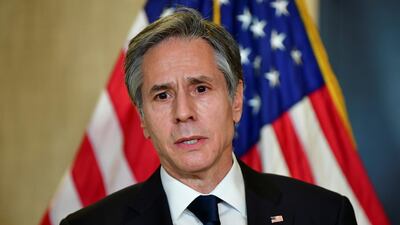US Secretary of State Antony Blinken arrived on his first official trip to Europe on Monday, stressing a unified front against China and repairing transatlantic ties damaged under the administration of Donald Trump.
Just as Mr Blinken left for Brussels, the US, the EU, Canada and the UK moved to place human rights sanctions on Chinese figures.
These included two officials in China's western Xinjiang province: Wang Junzheng, the secretary of the party committee of the Xinjiang Production and Construction Corps, and Chen Mingguo, director of the Xinjiang Public Security Bureau.
Mr Blinken raised the issue of a unified front across the Atlantic to co-ordinate measures on China.
The trip underscored “the Biden administration's determination to strengthen the transatlantic alliance and reinvigorate our ties with allies through Nato", the State Department said.
Mr Blinken, who is fluent in French and grew up in Paris, has a special affinity with the continent and has held several online meetings with foreign ministry officials there since taking office.
Although growing tension with China and dealing with Russia will top the agenda on his three-day trip, he is also expected to discuss Covid-19 efforts, Iran, Turkey, the war in Afghanistan, cyber security, terrorism, climate change and other topics.
The State Department said he would meet European Commission President Ursula von der Leyen, EU foreign policy chief Josep Borrell, Belgium’s Foreign Minister and Deputy Prime Minister Sophie Wilmes, and Nato Secretary General Jens Stoltenberg.
Mr Blinken will deliver a keynote address to the ministers and hold meetings with some foreign affairs leaders.
In a briefing before the trip to Brussels, Philip Reeker, US acting assistant secretary of state at the Bureau of European and Eurasian affairs, said the priority was to revitalise Nato ties.
“The secretary is going to also consult with the European Union on how we can work together on the basis of our shared values to address global challenges that come from Iran, Russia and China,” Mr Reeker said.
On Iran, the US is looking for “meaningful diplomacy” to achieve a mutual return to the nuclear deal.
“I think you’ve heard from others that unfortunately Iran has so far continued to take steps in excess of [nuclear] limits instead of actually engaging in the diplomatic process that’s been offered,” Mr Reeker said.
China said that its Foreign Minister, Wang Yi, would visit Tehran on Friday and Saturday to discuss bilateral co-operation.
Mr Reeker did not confirm if Mr Blinken would meet Turkish Foreign Minister Mevlut Cavusoglu.
“I don’t have any specific pull‑asides or other meetings to announce at this point, but clearly I’d let the Turkish government announce ... their attendance and plans,” he said.
Mr Reeker stressed Ankara and Washington's shared interests in counter terrorism and ending the conflict in Syria.
Media reports from Ankara have said Mr Blinken would meet Mr Cavusolglu.
Another matter of interest is Nord Stream 2, the $11 billion pipeline project that would carry gas under the Baltic Sea to Europe through Germany.
As Russian energy company Gazprom is involved with the project, it is subject to US sanctions.
Mr Blinken said last week that the Biden administration was committed to complying with those sanctions even if its ally Germany became a target.


